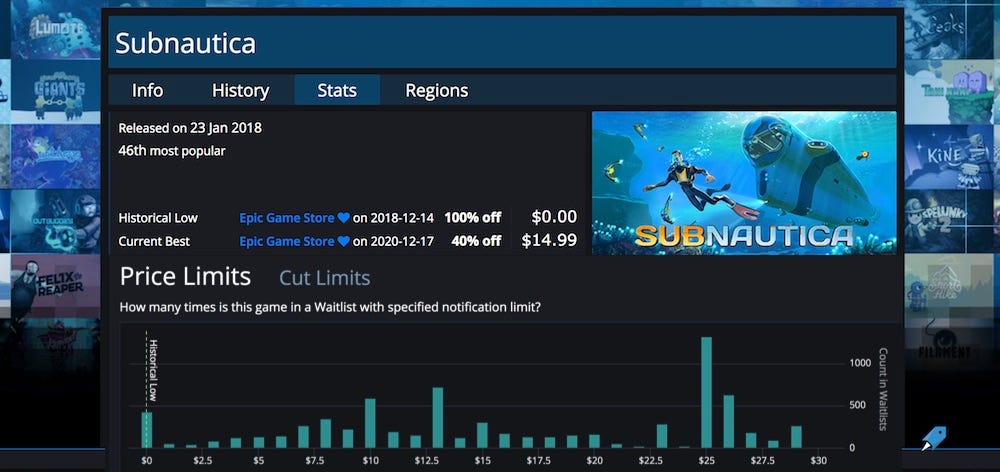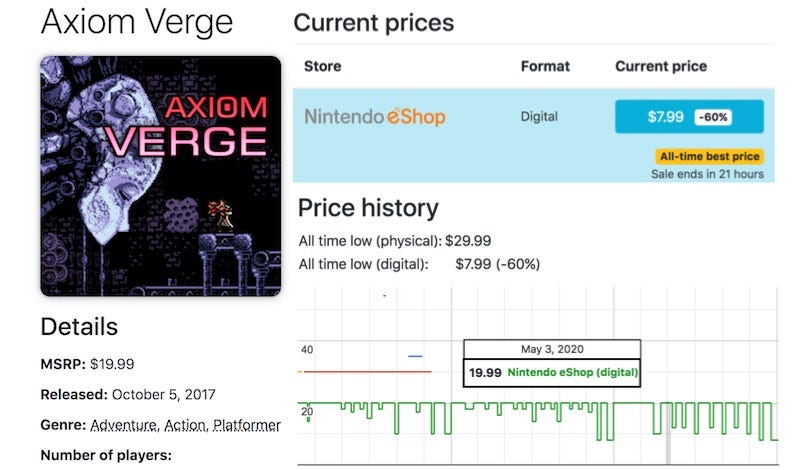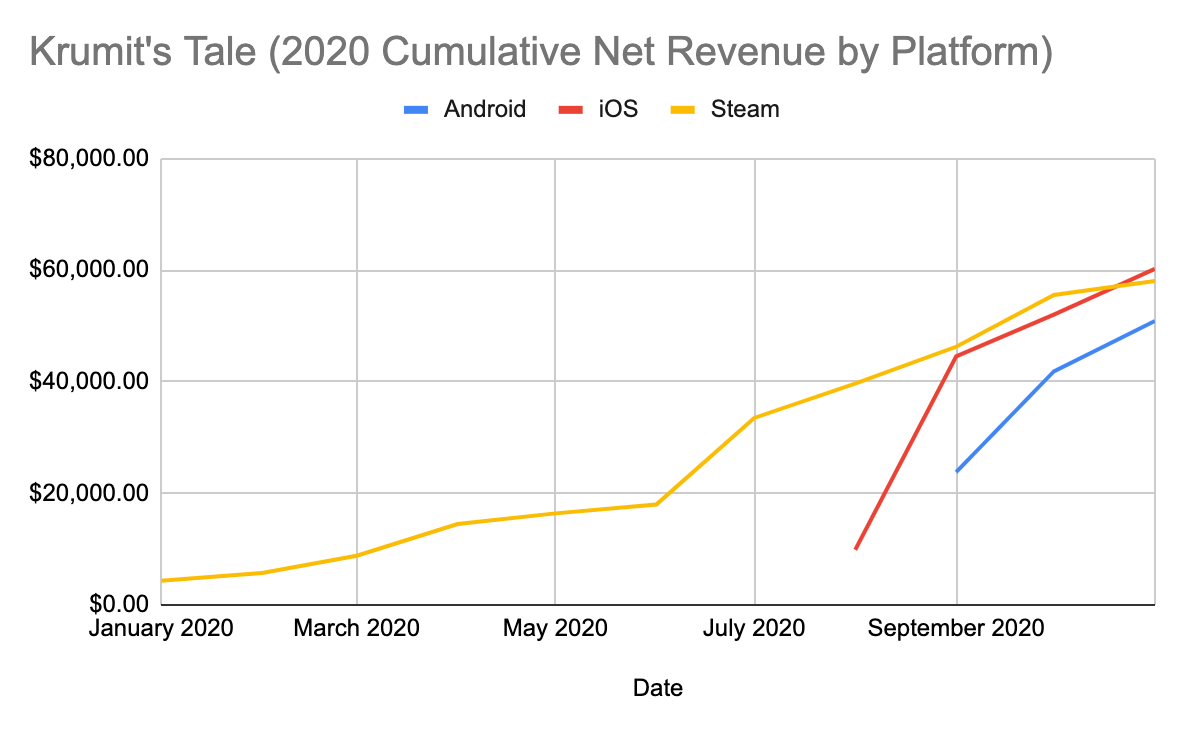
Featured Blog | This community-written post highlights the best of what the game industry has to offer. Read more like it on the Game Developer Blogs.
So, when your game has been released, how do you get people to keep talking about it or buying it? Discounts are key, but are you looking at comparables, & do you have a methodical strategy?

[The GameDiscoverCo game discovery newsletter is written by ‘how people find your game’ expert & GameDiscoverCo founder Simon Carless, and is a regular look at how people discover and buy video games in the 2020s.]
Welcome to the second GameDiscoverCo column for the first week of January 2021. Look, it’s a pretty crazy week here in the U.S. right now. Lots of breaking political news of the ‘new Trump lows’ type emerged - so I didn’t think it right to put this newsletter out yesterday. But gotta keep going somehow here, so here we are.
Are you winning at post-launch discounts?

So, when your game has been released - whether you be a solo developer or a large publisher - how do you get people to keep talking about it or buying it?
Building in marketing and discovery ‘beats’ for patches, expansions, and DLC is one way - if your game is compatible with that style of development. (I think it’s more and more important for long tail sales that your game is.) And of course, you can keep approaching streamers even after release, although likely with diminishing returns.
However, we do think that some game makers don’t spend enough time being 100% methodical about discount timings and amounts. And we do believe judicious discounting is possibly the most powerful post-launch discovery tool for your games.
For every developer who is completely synchronized on this, there are others that hold back. This can be partly because they are concerned about perceptions that they discount too much, and partly because the logistics of keeping all the multi-platform discounts straight can be complex.
There are now platforms helping with logistics. I haven’t talked about IndieBI much, partly because I didn’t want to overwhelm them with interest. But the revenue/sales tracking platform client that the company is early in building includes clear multi-platform sales data for your own games, with sale timing reminders. Highly recommend.
And if we’re looking for indications on what other devs and publishers are doing in the space - or what players want in order to buy - there’s some great options:
Is There Any Deal? is a PC-based deal monitoring site for players. It’s particularly interesting because you can see how many registered site members are waiting for discounts on a game, and at what discount they’re going to get notified. (See above picture, for an example involving Subnautica. Slightly odd example because the game’s base price has changed a couple of times, but you get the idea. Thanks to Lars Doucet for pointing this out.)
SteamDB is always spectacularly helpful, and the main game page for each Steam title has a discount history if you scroll down. Here’s an example for the original Overcooked. Team17 is pretty ruthlessly efficient at discount revenue maximization, by the way. So I recommend checking out some of their games for approaches, both for frequency and discount amount.
DekuDeals is a good site to browse for Nintendo Switch, though it includes a lot of cheap retail titles. So maybe browse to the eShop section if you’re interested in the digital side of things. Looking at games like Axiom Verge (see below) clearly brings up sales and discount history. eShop Prices is also a good ‘discounts / discount history’ site on the Switch side of things.

Anyhow, our belief on discounts is pretty simple, and is as follows:
Frequency: you should discount your games at every available opportunity. Not necessarily at massive percentages to start with, though! It’s not seen as a negative from a player perspective, since most players only notice a fraction of available discounts. It’s all about being methodical about the Steam discounting rules, finding ‘special’ sales you are eligible for, and being similarly exacting for Switch (discount rules NDA-ed, but go find ‘em if you have access!) Xbox and PlayStation are more complex - they have no at-will discounts - but work with your rep, and get in whatever discounts you can.
Amount: it’s our view that gradually increasing discounts is the best practice. (So don’t jump discounts down and then back up again. Unless perhaps there’s a ‘viral’ Switch-style one off discount you want to try?) As for how aggressive you are - it varies per platform, and Switch has been tending more aggressive recently. But I personally like Steam discount strategies like Overcooked 2’s, taking the game down to 50% off over a period of about 2 years.
Aggressiveness: There’s no doubt that some games get more aggressively discounted %-wise, and you can potentially make more cash that way. Curve’s Bomber Crew got to 50% off on Steam swiftly, and is at 80% off in sales nowadays. And even the relatively new Hotshot Racing was 50% off in the Winter Sale, four months after launch. Bit strong for my tastes, but I also think No More Robots probably underdiscounts somewhat. Not Tonight has never been more than 40% off on Steam (for the base game - the bundle with the DLC has been >40% off), despite releasing in 2018. Perhaps too conservative, and leaving money on the table?
Concluding - there’s no concrete playbook for this. And obviously ‘revenue maximization at all costs’ would lead to games being overly discounted (50-90%) at all time, and would usher in the dominant era of the Netflix-style game subscription services months (months!) earlier than we expect. (It’s currently scheduled for 2023. Kidding. Sorta.)
But being thoughtful and methodical about the discounting rules you want to follow, whether with one game or a portfolio, is important. For many games, it really is the most under-optimized post launch discovery mechanism for your game. Especially on Steam, due to the way wishlist reminders/emails are sent out. Food for thought, eh?
The game discovery news round-up..

So, on to round-ups. And thanks to GI.biz for reprinting the Raw Fury publishing contract newsletter earlier this week, for some extra reach. Given it’s a messy time, let’s just get to some notable game discovery round-ups, and put a cork in this particular newsletter:
The ever-transparent semi-pro dev Eric at Slothwerks, who provided us two excellent newsletters on deckbuilding roguelike Meteorfall: Krumit’s Tale fairly recently, is back with his 2020 round-up. These include revenues (see above graph) for Krumit’s Tale, as well as its predecessor Meteorfall: Journeys. Also interesting to hear his comments about Google Play Pass and publishing on the TapTap Android store in China, among other subjects.
Large-ass game research firm Superdata just released its 2020 year in review, and VentureBeat has a fairly in-depth overview. Skimming quickly: “Free-to-play games continued to generate the vast majority of revenue (78%), with Asian markets accounting for 59% of free-to-play earnings… SuperData said industry consolidation will continue in 2021 as developers and publishers fight for a spot in a competitive market.” Oh great, consolidation.
The devs at Stuck In The Attic, makers of point & click adventure game Gibbous: A Cthulhu Adventure, put out some public stats about their performance in the Steam Winter Sale. We love public stats! They’ve reached 40k units sold on Steam, and the Winter Sale was “An average of 450 units sold per day at 70% off… pretty good for an adventure game that's 1.5 years old.” The game originally launched in 2019 with 31,000 wishlists, and “We've sold very close to 10k units on Steam alone this winter.” Though the discount was 70% this time, “to put it into perspective, it took us ~1 year to reach 50% off.” Interesting data, and not possible without “good hooks [and] good production values”, as they note.
It’s significantly outside the mainstream, but enjoyed this piece from The Register on those still making Linux ports for their games - to target Linux players, or because they like them. Not much $ upside, but as noted: “Things are changing in Linux gaming. [Friends of] Valve now have Proton, a project that does a good job of running many Windows games on Linux platforms. That's unlikely to stop Linux devs doing their thing, either via native code or multi-platform engines.” We think Proton is a great way to worry less about Linux support for your game.
Complaining about the 30% ‘platform shakedown’ over here in the West? Cut to China, where “Tencent’s online games were removed and then reinstated on Huawei’s app store on Friday in a dispute over revenue sharing by the Chinese companies. Huawei was insisting on a 50% cut of Tencent’s game sales on the app store and the Tencent games were removed because the companies had been unable to agree a deal, a Tencent source said.” Yikes. (And no, I’m not saying 30% is fair either.)
Microlinks: a ridiculously large heap of games (39,000!) disappeared from the Chinese iOS App Store at the end of 2020 due to no government license; a free iOS/Android game postmortem with out-of-pocket cost at $4k, and revenue of $30 shows how difficult it can be to get traction; this Tweet about how instant/welcoming the Flash game ecosystem made me think, again, that the lack of effective monetization at the ‘super cool shorter game’ level is a real problem. Anyone know how to fix?
Finally: just a shout-out that the GameDiscoverCo Plus-exclusive newsletter coming on Friday will be the first of an expanded series. It’ll be dealing with our algorithmic Steam pre-launch ‘Hype’ scores, of course. But it’ll also add new Switch and Xbox sales analysis sections (and AMA answers.) So sign up now - here’s the stuff you get with a paid subscription - and help keep us sending out the quality info to all.
[We’re GameDiscoverCo, a new agency based around one simple issue: how do players find, buy and enjoy your premium PC or console game? You can now subscribe to GameDiscoverCo Plus to get access to exclusive newsletters, interactive daily rankings of every unreleased Steam game, and lots more besides.]
Read more about:
Featured BlogsAbout the Author(s)
You May Also Like









